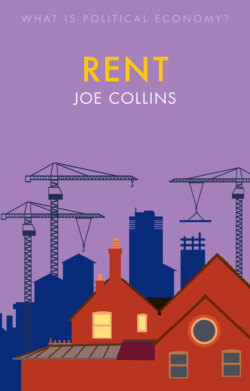Rent

Реклама. ООО «ЛитРес», ИНН: 7719571260.
Оглавление
Joe Collins. Rent
Table of Contents
List of Illustrations
Guide
Pages
Series Title. What is Political Economy? series
Rent
Copyright Page
Dedication
Acknowledgements
1 What is Rent?
Introducing the new ‘-ization’ of the 2020s
The contested meaning of rent: land or monopoly?
Notes
2 Rent Theory in Historical Perspective
Rent before capitalism
Physiocracy and landed property in capitalism
Classical political economy and the class war on rentiers
Marx’s ‘shitty rent business’
Notes
3 Mainstream Rent Theory
Economic rent
Quasi-rent
Monopoly rent
Rent seeking
Neoclassicals and the ‘end of history’ for rent?
Notes
4 Rent Theory in Modern Political Economy
World mining rent and financialized food
Technoscience rent
Land rent at the margins
Resource curse, Dutch disease and rent policy
Defining rent?
Notes
5 Why is Rent Important Today?
Rent and economic inequality
Ecology, rent and the climate crisis
Global rentier capitalism and economic dynamism
Concepts and contexts in rent theory
Notes
References
Index
POLITY END USER LICENSE AGREEMENT
Отрывок из книги
Joe Collins
Many thanks to George Owers and two anonymous readers for sharp and thorough comments on a chaotic first draft. Reader 2, who typically gets a bad rap, gets special mention for a fair and tough appraisal that continues to offer much food for thought. Thanks, also, to Julia Davies for patiently guiding a novice author through the publication process of his first book. Gail Ferguson’s expert copyediting is much appreciated. So, too, is the professionalism of Evie Deavall, Sue Duncan, Neil de Cort and the rest of the Polity crew responsible for producing this book.
.....
Rentier capitalism is the latest stage of capitalism, according to this growing body of scholarship. To take one recent definition of the concept, rentier capitalism is a ‘system of economic production and reproduction in which income is dominated by rents and economic life is dominated by rentiers’. This system is not just one dominated by rents and rentiers, it is ‘in a much more profound sense, substantially scaffolded and organized around the assets that generate those rents and sustain those rentiers’.29 Rent, according to this account, is ‘payment to an economic actor (the rentier) who receives that rent – and this is the key factor – purely by virtue of controlling something valuable’ (italics in the original).30 This new variant differs from its predecessors in that capitalism is so named because it is, at least according to its devotees, driven by the entrepreneurial nous of capitalists, employing labour and resources to produce goods and services, profiting in the process so as to invest in further rounds of production, promoting growth of the system. This new rentier variant, whereby profits are increasingly taking the form of economic rents, is characterized by rentiers seeking to expand their asset portfolios in order to increase rents, without actually producing anything. Capitalism is meant to be about getting rich by doing things to make profits. Rentier capitalism is instead about getting rich by having things that create rents and then capturing them. Several books on the subject have been published in the last few years alone, with many more academic journal articles and journalistic pieces taking up associated themes, putting ‘rentier capitalism’ in prime position to become the social science buzzword of the 2020s.
It is in the context of this flurry of intellectual activity that the problem of rent has taken on renewed significance. The spectre of rentiers pocketing that which they did not earn is once again haunting the world. Their first appearance in the conventional story of capitalism was as wealthy landowners, reaping the rewards gifted by hereditary title while immiserated workers, shrewd industrialists and savvy merchants toiled to create a new social system that rewarded effort rather than accidents of birth. Their second coming, as monopolists of technology, minerals, housing and most other goods and services required to enjoy decent lives, is concerning, if, as the rentier capitalism literature suggests, today’s economy is structured primarily to make it easier for them to get rich by holding what the rest of us want and need to ransom. Whether these claims stack up is, for now at least, beside the point. Such arguments have become so popular now that they set the tone and register for how people talk about current social problems. Topics like inequality, climate change, economic crisis and now even the causes and consequences of pandemics are increasingly linked to questions of rent in the popular imagination.31 Think inheritance tax and inequality, resource rents and carbon emissions, the Google tax and fiscal crisis, and now also vaccine nationalism in response to the Covid-19 pandemic.
.....